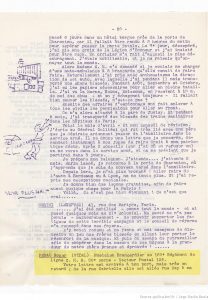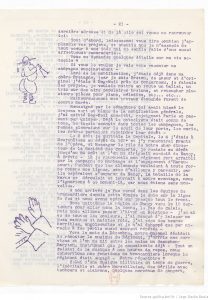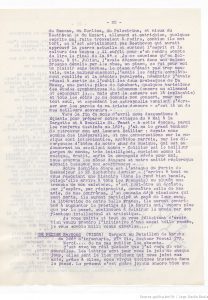Paris-Manchester 1918
Conservatoires in time of war
Becoming soldiers
This letter is typical of early contributions to the Gazette. Written more than a year after the mobilisation, it is Roger Pénau’s first attempt to communicate with his Conservatoire classmates as a group. After some quick, conventional expressions of thanks for the circular letter (paragraphs 1 and 2), Pénau recounts events in his life since the sudden loss of contact with his classmates. He makes quick work of the narrative of military events, with vague wording such as “it was only thanks to some miracle that I escaped the danger I so often found myself in”, and then goes on to describe his daily musical activities.
The repertoire played is especially interesting. While the military music, first and foremost the Marseillaise, seems unsurprising, the concert pieces suggest how eclectic the concerts at the front and rear were. The mention of Rameau and Palestrina bears witness to the relatively recent taste among French musicians for older music (similarly, in this period Ravel turns to Couperin for his Tombeau de Couperin, and Debussy to Rameau in his Sonatas). The inclusion of German composers may seem more incongruous, given the nationalistic sentiments then current in musical circles, at least in Paris. In fact, however, Pénau’s position is in accord with that taken by a good many of his contemporaries. It should be understood in the context of the debate on the German question that had continued among French intellectuals since 1871.[1] A distinction was made between “pre-Kultur” Germans (Bach, Haydn, Mozart, Beethoven, Schubert, Schumann etc.), considered “innocent and very human”,[2] and the un-modern Germans of the “Kultur” movement (the French being the only modern people): Wagner, Brahms, Bruckner, Schoenbeg etc.
[1]On this topic, see Claude Digeon (1959) La crise allemande de la pensée française (1870-1914), Paris, Presses universitaires de France.
[2]Camille Mauclair, “Pour l’amour de la fée”, Le Courrier Musical, 1 December 1916.
Facsimile
Translation
PENAU Roger (VIDAL[3]), musician-stretcher-bearer, 160th Line Regiment, C.H.R.,[4] 20th Corps, Postal Sector 125
Your letter[5] did reach me, but it was very late. From Rue Gabrielle it went to my previous address in Rue Say, and from there it made its way to me here.
First of all, I’d like to say how much I agree with your plan for a gazette. The idea seems to spring from the warmest friendship, and I wholeheartedly support it. .
You asked for some details of my life at present.
If you like, I can tell you briefly how the campaign went.
When I was called up,[6] I was already in Brittany, a region I love (being Breton, in my heart and by birth). I was at Beg-Meil near Concarneau, working on some projects – I wanted to put on a ballet, form a trio to play Breton popular music, rework some piano pieces and melodies etc. etc. . . .
Unfortunately the work I had started was cut short.
Alerted by the semaphore station, which had hoisted the green and white flag for general mobilisation, I left Beg-Meil immediately and returned to Paris via Quimper. Everybody already knew of the momentous event – alarm bells were being rung throughout the countryside, women were crying on their doorsteps, husbands and brothers were leaving for their depots.
I left the capital on 2 August. On the 4th I was at the 160th‘s depot, and there I met Frantz from the Opera and young Messager, the son of our dear director from the Société des Concerts.[7] I stayed at the depot until 24 August, and then I was sent past Nancy as far as Crévic, where I found my regiment badly weakened by the Morhange campaign and the fighting at Haraucourt.[8] While the Germans, in the hope of taking Nancy, were trying to break through our lines at all costs (without succeeding, by the way), the Battle of the Marne was being fought, and the fighting was starting to go our way.[9] We didn’t know that at the time though as no news had reached us.
On arriving I was assigned to the stretcher-bearer team; since then I have been on the front lines, and we’ve done our duty almost everywhere on the front.
We left the Nancy area around 10 September to go first into the Somme and Pas-de-Calais regions, before heading to spend the winter in Belgium – that was a nightmare, and I missed death by a whisker a good many times. I passed through hours of horror and dread, and it was only thanks to some miracle that I escaped the danger I so often found myself in.
In December, our colonel decided to reassemble the regimental band. I offered my services and was given a baritone saxophone[10] an instrument I was already familiar with. We played music during our rest periods and continued our stretcher-bearer duties when the regiment was in action. And our repertoire?
It was what military bands tend to play in wartime – inevitably the dear old Marseillaise, marches for drums and bugles, a few concert pieces, some Rameau,[11] Berlioz,[12] Palestrina[13], as well as, happily, some Beethoven[14] and Mozart[15] – a German and an Austrian. Some fools complained about that, and how wrong they are – Beethoven certainly would not have welcomed this war, and even less would he have approved of the Huns’ mentality and their culture; you have only to read the final movement of the 9th to know that. I remember, when I was in St. Julien in Belgium, finding a piano in a house that the shells had almost completely demolished, and that was an infinite pleasure for me. The piano was not too bad; unfortunately, I had terribly stiff fingers and a failing memory, but I did manage to dredge up the two Arabesques by De Bussy,[16] a small piece by Schubert,[17] a few variations from Schumann’s[18] Symphonic Studies (another German and yet I . . . careful– the censors would never allow me to say that) and every evening I would put on a concert, just for myself, even as shrapnel[19] bullets were crashing into the walls of my dismal quarters. That is one of my best memories.
Towards the end of April,[20] we went down to Equavic to get ready to attack la Targette and Neuville St Vaast[21] on 9 May. It was then that I had the great pleasure of seeing my friend Laurent Ceillier again, among the reinforcements sent to the 160th; we’ve been inseparable ever since, and our conversations about music go on forever, although sometimes they are interrupted by differences of opinion with our bandmaster, who is nonetheless an excellent man. Ceillier is the best chap in the world – very intelligent, a born musician, learned, just the ideal companion for me; we share our dangers, and our friendship for each other does a lot to relieve our hardships.
Our final stage was the attack on the strongpoint at Beauséjour[22] on 25 September last.[23] And with that I come to the end of my story (quite a banal story, really, because every Frenchman is experiencing it), or rather the description of a stretch of my life, which I’ve been telling you about for perhaps selfish reasons, because in return I hope to hear the stories of my friends and classmates. I know that several of them have given their lives for the freedom of our beloved France, adding to the glory of our homeland, whose thinkers and artists will henceforth, even more than ever before, be like a torch shining a light on the world.
I shall finish by congratulating you on putting such a splendid idea into practice, and send you my very best wishes. . . .
Notes
[3]Paul Vidal (1863-1931), teacher of music theory, accompaniment and composition at the Paris Conservatoire.
[4]Compagnie hors-rang [exterior company]. Single company within a regiment that performs the regiment’s administrative, logistical and command functions. It includes a team of stretcher-bearers who also serve as the regimental band.
[5]This refers to the circular sent by Nadia and Lili Boulanger in October 1915 to their composition classmates inviting them to write to the future Gazette (Bibliothèque nationale de France, Music department, Rés Vm Dos-88 (10), f. 7).
[6]1 August 1914.
[7]André Messager (1853-1929) conducted the Orchestra of the Société des Concerts du Conservatoire from 1908 to 1919.
[8]At the battle of Morhange on 19 and 20 August 1914, the French army suffered a crushing defeat by the German artillery. Haraucourt lies about 25 miles from Morhange.
[9]The Battle of the Marne lasted from 5 to 12 September 1914.
[10]Sic.
[11]Jean-Philippe Rameau (1683-1764).
[12]Hector Berlioz (1803-1869).
[13]Giovanni Perluigi da Palestrina (1525-1594).
[14]Ludwig van Beethoven (1770-1827).
[15]Wolfgang Amadeus Mozart (1756-1791).
[16]Claude Debussy (1860-1918).
[17]Franz Schubert (1797-1828).
[18]Robert Schumann (1810-1856).
[19]Shrapnel – Shell designed to explode in flight, releasing lethal bullets.
[20]1915.
[21]This refers to the Battle of Artois (9 May to 25 June 1915).
[22]Position half-way between Reims and Verdun.
[23]1915.
Source
Roger Pénau (1915) Letter to the Franco-American Committee, in : Gazette des classes de composition du Conservatoire, No. 1, Paris, December 1915, Bibliothèque nationale de France, Music department, Rés Vm Dos 88 (1), p. 20-22.
View on Gallica
Illustrations by Jacques Debat-Ponsan.
Document description: mimeographed document in violet ink, 21×27 cm.






